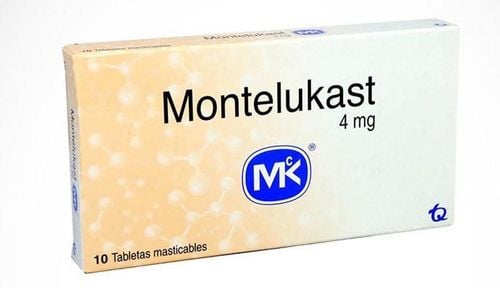This is an automatically translated article.
Aspirin can be prescribed by doctors for pregnant women with a history of stillbirth, pre-eclampsia. However, to ensure safety during drug use, pregnant women need to inform the doctor about the drugs they are using, the history of allergies and periodic follow-up visits according to the doctor's appointment.
1. How does aspirin work?
Aspirin, also known as acetylsalicylic acid. An analgesic, antipyretic and anti-inflammatory drug. Similar to other non-steroidal anti-inflammatory drugs, Aspirin works by inhibiting the COX enzyme (cyclooxygenase), leading to inhibiting the synthesis of chemicals that cause inflammation and pain such as burns, trauma, viruses... In particular, Aspirin is also used in acute and chronic inflammatory conditions such as rheumatoid arthritis, ankylosing spondylitis or osteoarthritis...
Besides, because of its antiplatelet effect and vasodilation. Therefore, aspirin is used to prevent some cardiovascular diseases, pregnancy complications and cancer.
2. Aspirin's role in pregnancy
During pregnancy, aspirin is prescribed by doctors to prevent and treat the following syndromes:
Aspirin and antiphospholipid syndrome: Aspirin at low doses (75-100mg) is often combined with anticoagulants ( Heparin) is indicated for pregnant women with a history of recurrent miscarriages due to antiphospholipid syndrome. This is an autoimmune disorder that increases the likelihood of blood clots forming during pregnancy, preventing nutrients from reaching the fetus. Aspirin and pre-eclampsia: There is strong evidence that daily low-dose aspirin (75-100 mg) is effective in preventing complications in women at high risk of developing pre-eclampsia. Preeclampsia is a dangerous complication of pregnancy, caused by dangerously high blood pressure and protein in the urine. This condition will affect many organs in the body and affect the blood flow to nourish the fetus. In terms of dosing, the American College of Obstetricians and Gynecologists (ACOG) recommends starting daily low-dose aspirin between weeks 12-28 of pregnancy (preferably before week 16) until labor at birth. women at high risk of preeclampsia.
The American College of Obstetricians and Gynecologists also points to high risk factors that warrant early use of low-dose aspirin, such as:
People with a history of pre-eclampsia, kidney failure, or autoimmune diseases (eg, lupus) erythema); Type 1 or 2 diabetes; Chronic hypertension; Pregnant with multiples; Having more than one of the average risk factors such as: Body mass index BMI > 30, family history of pre-eclampsia syndrome, first pregnancy, gestational age > 35, being of African descent , a 10-year interval between pregnancies.
3. Note taking Aspirin when there is a history of stillbirth
In the early stages of pregnancy, taking aspirin before pregnancy can increase your chances of conceiving. While pregnant, taking low-dose aspirin does not pose any risk of miscarriage, but at high doses it can increase the risk of birth defects in the unborn baby.
In the last stage of pregnancy, taking Aspirin in the last 3 months can cause the ductus arteriosus to close prematurely, slow labor. This can cause your baby's heart and lungs to show signs of abnormality. In addition, it can also cause prolonged bleeding in mother and baby. However, you don't need to worry if you only use it occasionally.
To ensure safety during drug use, when there is a history of stillbirth, pregnant women should note the following:
Fully inform your doctor about any drugs or supplements you are taking, because Aspirin May cause adverse interactions with certain medications and increase the risk of prolonged bleeding. Patients with a history of allergy to aspirin, hypersensitivity to other salicylates and NSAIDs or bronchial asthma with a history of aspirin-induced acute bronchospasm; history of gastrointestinal bleeding; active gastric and duodenal ulcer disease; Severe liver dysfunction should be reported to your doctor because aspirin is contraindicated in these situations, even at low doses. When aspirin is indicated in pregnancy, pregnant women should have regular and regular checkups to evaluate the ductus arteriosus as well as the amount of amniotic fluid by ultrasound. In general, during pregnancy, pregnant women should not arbitrarily use any medication without the prescription of a treating doctor. At Vinmec International General Hospital, there is a package Maternity service that helps to monitor the health status of mother and baby comprehensively, periodical antenatal check-ups with leading Obstetricians, fully perform all important testing and screening for pregnant women, counseling and timely intervention when detecting abnormalities in the health of mother and baby.
The Obstetrics Department of Vinmec International General Hospital has been highly appreciated by customers for its professional quality as well as professional care services by:
Comprehensive mother and baby care: Whole mother & baby health care present, from before - during - after a full pregnancy; prenatal and postnatal screening for infants and mothers; heel test; package maternity ; pre-marital examination; prenatal care and counseling; cord blood storage. Children receive the best care from birth: right after the baby is born, the baby is skin-to-skin with the mother, the father cuts the umbilical cord by hand and is monitored and cared for in the special care room for a few days. 12 hours for early detection of transient respiratory failure or other medical conditions. The baby is fully vaccinated. The birth team not only has obstetricians and midwives but also has pediatricians on duty, monitoring to handle problems arising for the baby during the birth process. Modern and advanced techniques: Painless delivery with special anesthetic techniques. Treatment and care for extremely premature babies < 27 weeks - Vinmec is the only hospital in the North that can save the lives of babies born 24 weeks premature. Outstanding equipment: The room is designed according to international hotel standards, with modern equipment such as specialized transport incubators with ventilators, blood suction, pressure controlled oxygen tubes; deafness screening machine, brain cooling machine to treat asphyxia; CFM brain function monitor; Monitor 5 parameters; Resuscitation bed with built-in heating lamp.
Please dial HOTLINE for more information or register for an appointment HERE. Download MyVinmec app to make appointments faster and to manage your bookings easily.













